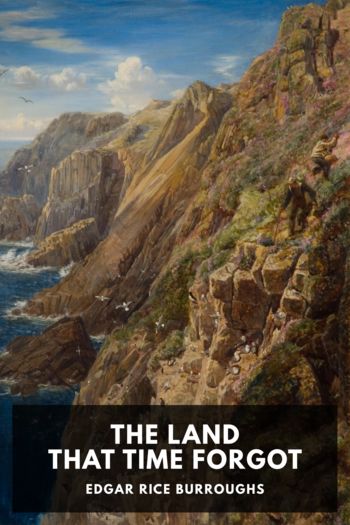South!, Ernest Shackleton [good books to read in english TXT] 📗

- Author: Ernest Shackleton
Book online «South!, Ernest Shackleton [good books to read in english TXT] 📗». Author Ernest Shackleton
An interesting incident on November 26 was the discovery of an emperor penguin rookery. Ninnis and Kavenagh took a long walk to the northwest, and found the deserted rookery. The depressions in the ice, made by the birds, were about eighteen inches long and contained a greyish residue. The rookery was in a hollow surrounded by pressure ridges six feet high. Apparently about twenty birds had been there. No pieces of eggshell were seen, but the petrels and skuas had been there in force and probably would have taken all scraps of this kind. The floes were becoming soft and “rotten,” and walking was increasingly difficult. Deep pools of slush and water covered with thin snow made traps for the men. Stenhouse thought that a stiff blizzard would break up the pack. His anxiety was increasing with the advance of the season, and his log is a record of deep yearning to be free and active again. But the grip of the pack was inexorable. The hands had plenty of work on the Aurora, which was being made shipshape after the buffeting of the winter storms. Seals and penguins were seen frequently, and the supply of fresh meat was maintained. The jury-rudder was ready to be shipped when the ship was released, but in the meantime it was not being exposed to the attacks of the ice.
“No appreciable change in our surroundings,” was the note for December 17. “Every day past now reduces our chance of getting out in time to go north for rudder, anchors, and coal. If we break out before January 15 we might get north to New Zealand and down to Cape Evans again in time to pick up the parties. After that date we can only attempt to go south in our crippled state, and short of fuel. With only nine days’ coal on board we would have little chance of working through any Ross Sea pack, or of getting south at all if we encountered many blizzards. Still there is a sporting chance and luck may be with us. … Shackleton may be past the Pole now. I wish our wireless calls had got through.”
Christmas Day, with its special dinner and mild festivities, came and passed, and still the ice remained firm. The men were finding some interest in watching the moulting of emperor penguins, who were stationed at various points in the neighbourhood of the ship. They had taken station to leeward of hummocks, and appeared to move only when the wind changed or the snow around them had become foul. They covered but a few yards on these journeys, and even then stumbled in their weakness. One emperor was brought on board alive, and the crew were greatly amused to see the bird balancing himself on heels and tail, with upturned toes, the position adopted when the egg is resting on the feet during the incubation period. The threat of a stiff “blow” aroused hopes of release several times, but the blizzard—probably the first Antarctic blizzard that was ever longed for—did not arrive. New Year’s Day found Stenhouse and other men just recovering from an attack of snow-blindness, contracted by making an excursion across the floes without snow-goggles.
At the end of the first week in January the ship was in lat. 65° 45′ S. The pack was well broken a mile from the ship, and the ice was rolling fast. Under the bows and stern the pools were growing and stretching away in long lanes to the west. A seal came up to blow under the stern on the 6th, proving that there was an opening in the sunken ice there. Stenhouse was economizing in food. No breakfast was served on the ship, and seal or penguin meat was used for at least one of the two meals later in the day. All hands were short of clothing, but Stenhouse was keeping intact the sledging gear intended for the use of the shore party. Strong, variable winds on the 9th raised hopes again, and on the morning of the 10th the ice appeared to be well broken from half a mile to a mile distant from the ship in all directions.
“It seems extraordinary that the ship should be held in an almost unbroken floe of about a mile square, the more so as this patch was completely screwed and broken during the smash in July, and contains many faults. In almost any direction at a distance of half a mile from the ship there are pressure ridges of eight-inch ice piled twenty feet high. It was provident that although so near these ridges were escaped.”
The middle of January was passed and the Aurora lay still in the ice. The period of continuous day was drawing towards its close, and there was an appreciable twilight at midnight. A dark water-sky could be seen on the northern horizon. The latitude on January 24 was 65° 39½′ S. Towards the end of the month Stenhouse ordered a thorough overhaul of the stores and general preparations for a move. The supply of flour and butter was ample. Other stores were running low, and the crew lost no opportunity of capturing seals and penguins. Adelies were travelling to the east-southeast in considerable numbers, but they could not be taken unless they approached the ship closely, owing to the soft condition of the ice. The wireless plant, which had been idle during the months of daylight, had been rigged again, and Hooke resumed his calls to Macquarie Island on February 2. He listened





Comments (0)